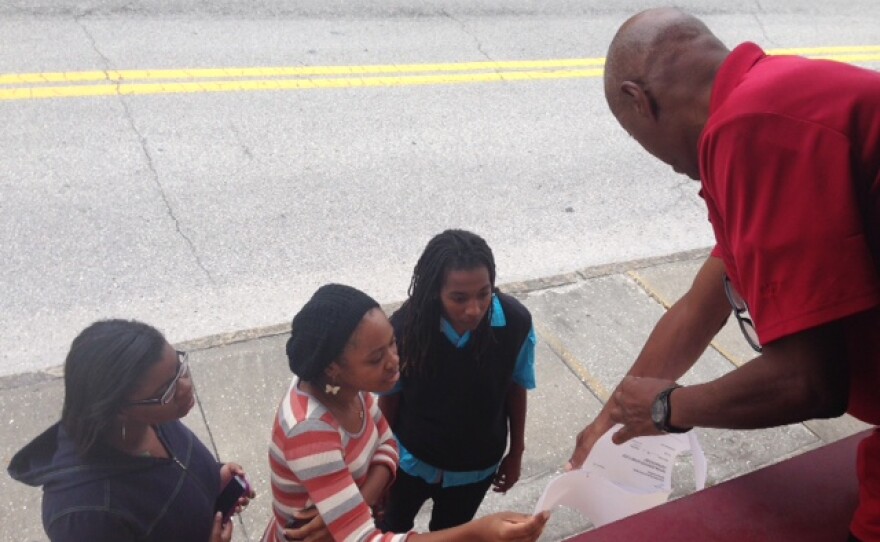There have been a few projects geared to create a renaissance of the rich African-American history that is part of the bedrock of Tampa.
The proposed Perry Harvey Senior Park would honor the African-American hub of businesses that lined Central Avenue before much of the area was bulldozed in the 1960s. One of the few historic landmarks of that time still standing is the Jackson Rooming House on East Zack Street. For years, plans have been in place to restore it, but those are currently at a standstill.
At the edge of Downtown Tampa, with its high-rises and commercial buildings, stands the two-story Jackson House. The lone survivor of what used to be a vibrant area could easily be missed if you're not looking for it, as it's now surrounded by asphalt parking lots.
The house has holes on the roof and the structure isn't so steady. But stand on the porch or sit on the bench with the red chipped paint, and you can easily feel how this was once a home.
“First of all, I’d like to say, 'Welcome to you, to the Jackson House, Ms. Ramos,'” says Willie Robinson Jr., as he greets me with a smile.
The house has been in his family for three generations, standing in this very spot for more than 100 years. It's also now on the National Register of Historic Places.
During the peak years, when Central Avenue was considered the Harlem of Tampa, the 24-bedroom Jackson Rooming House was a place where black travelers could lodge. It stood just across the street from the old Union Railroad Station during the era of segregation.
It's the house where Ella Fitzgerald wrote her breakthrough hit song "A Tisket, A Tasket" and where Martin Luther King Jr. had breakfast at the kitchen table. But most importantly to Robinson, it's where his family lived for so many years.
“And that family reaches all the way back all the way into the 1800's,” Robinson says.
Robinson invites me to sit down on the porch as he brings out photo albums and framed pictures of his family.
“I want to introduce you to my grandmother- my mother’s mother- this is Sarah Jackson Robinson.”
Robinson's grandfather built the boarding house for her.
“I always make the comment that she had to be a very good looker or something that he liked, for him to build a 24-bedroom house for her. It’s kind of hard to get a 3-bedroom or a 2-bedroom house built, but for a 24-bedroom house, she had to be a looker,” Robinson said.
He adds that his family always had a good work ethic -- his grandmother oversaw three businesses.
“She started a laundry service because we (were) so close in proximity to the courthouse that her four daughters ran the laundry service," he said. "And for her two sons that she had, she started the first black cab company, which was named the Jackson Cab Company.”
Robinson brings out one last photograph of him and his mother sitting on this very porch, smiling for the camera.
“I got her to smile, she didn’t want to smile. But I got her to smile by telling her, 'you know you was my first girlfriend and the only girlfriend' and she just had to laugh at that," Robinson said.
Robinson's mother died a few months after that picture was taken in 2006, and Robinson inherited in the house. However, it's in pretty bad shape: the roof leaks and needs to be rebuilt to keep water from getting in. The house needs foundation work, asbestos and lead need to be removed, and an addition to the house has to be demolished.
In 2011, Tampa-based Bracken Engineering Inc. stepped in to help.
Matthew Depin is a project engineer. He says his company decided to help at no cost to Robinson.
“Once you get talking with Mr. Robinson and you realize the history of the house and the significance of it being the last privately-owned free standing structure in downtown with ties back to segregation and black history, there’s no way we could not be interested in the house and preserving all that it stands for,” he said.
Depin also said restoring the entire house would cost close to $1.5 million. Money is what is holding them back.
The only thing keeping Robinson from fundraising is a response from the IRS. He's created the Jackson House Foundation as a nonprofit organization so as to solicit tax-exempt donations. The IRS has sent a letter stating that it will make a decision within 90 days. For now, Robinson waits.
Editor's Note: After the publication of this story, Willie Robinson and members of his board met with city officials. City officials have given a one to two week deadline to get the entire structure of the house stabilized and shored.
Bracken Engineering will be erecting a temporary construction fence around the property by the end of the week (Oct. 14). The company will be submitting permit-ready drawings for placing the interior shoring by the following week. Then, donations and bids will be solicited for the shoring.
If the deadlines pass, it is not certain what actions the City will take but demolishing the house is a likely option.







